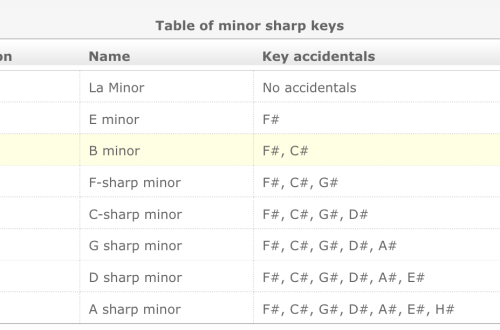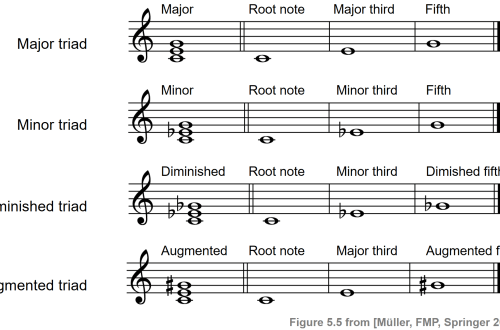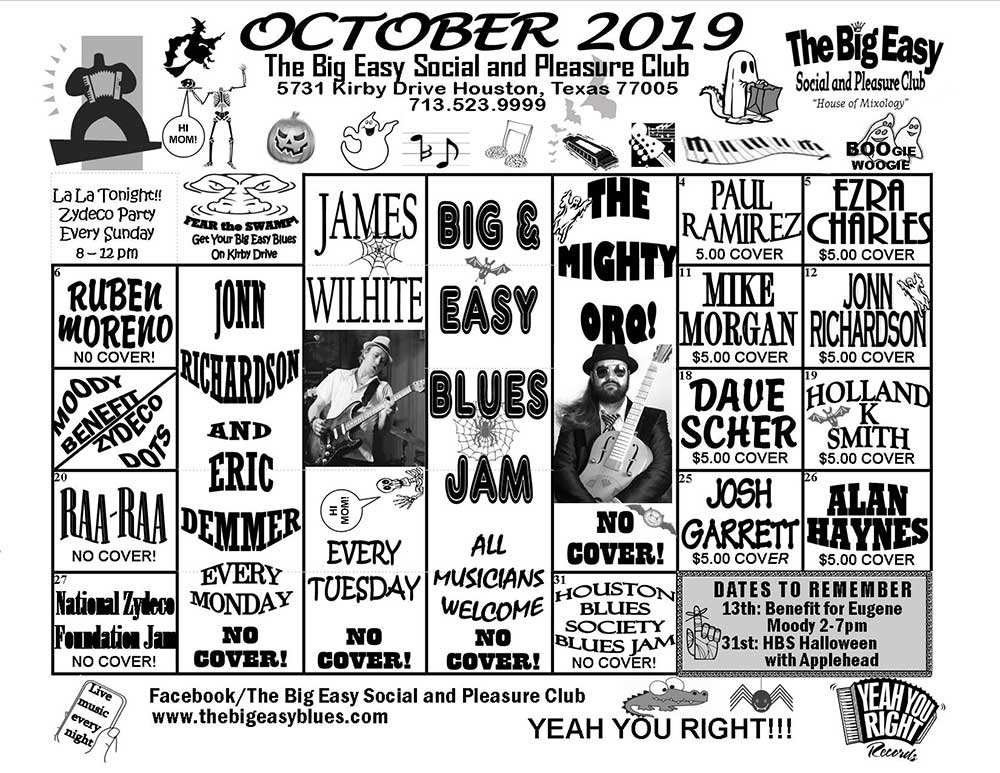
Music calendar – October
In October, the world music community celebrates the birthdays of several outstanding composers and performers. Not without noisy premieres that made people talk about themselves for many years.
Their creativity lives on today
October 8, 1551 in Rome was born Giulio Caccini, composer and singer, who wrote the famous “Ave Maria”, a work that breaks records in the number of interpretations not only in vocal performance, but also in arrangement for a variety of instruments.
In 1835, on October 9, Paris saw the birth of a composer whose work caused heated debate. His name is Camille Saint-Saens. Some believed that he was simply drumming on the piano, trying to extract as loud sounds from it as possible. Others, including R. Wagner, recognized in him the extraordinary talent of a master of orchestration. Still others expressed the opinion that Saint-Saens was too rational and therefore created few striking works.
On October 10, 1813, the great master of the opera genre appeared to the world, a man whose name is associated with a huge number of legends, myths intertwined with real events, Giuseppe Verdi. Surprisingly, the talented young man could not enter the Milan Conservatory due to his poor piano playing. This incident did not prevent the composer from continuing his education and eventually becoming what he is in musical history.
On October 22, 1911, Franz Liszt was born – a virtuoso pianist, a man whose life was spent in constant work: composing, teaching, conducting. His birth was marked by the appearance of a comet over the Hungarian sky. He participated in the opening of conservatories, devoted a lot of energy to musical education, and passionately experienced revolutions. To take piano lessons from Liszt, pianists from different European countries came to him. Franz Liszt introduced the idea of a synthesis of arts into his work. The composer’s innovation has found wide application and is relevant to this day.
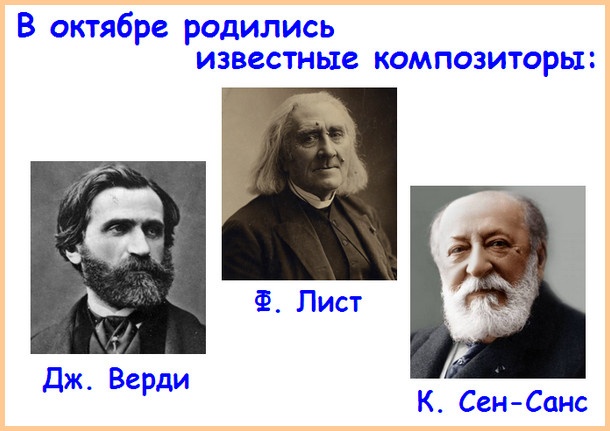
October 24, 1882 is the birthday of the master of Russian choral art, composer and conductor Pavel Chesnokov. He went down in history as a representative of the new Moscow school of church music. He created his own special folk-modal system based on the unique originality of a cappella singing voices. Chesnokov’s music is unique, and at the same time accessible and recognizable.
On October 25, 1825, the “king of the waltz”, Johann Strauss-son, was born in Vienna. The boy’s father, a famous composer, was against his son’s musical career and sent him to a commercial school, wanting his son to become a banker. However, Strauss-son entered into an agreement with his mother and secretly began to take piano and violin lessons. Having learned everything, the father in a rage took away the violin from the young musician. But the love for music turned out to be stronger, and we have the opportunity to enjoy the famous waltzes of the composer, the most popular of which are “On the Beautiful Blue Danube”, “Tales of the Vienna Woods”, etc.
P. Chesnokov – May my prayer be corrected …
Artists who conquered the world
On the 1st day of October 1903, a boy was born in Kyiv, who later became a famous American pianist – Vladimir Horowitz. His formation as a musician took place precisely in his homeland, despite difficult times for the family: loss of property, lack of money. Interestingly, the pianist’s performing career in Europe began with a curiosity. In Germany, where 1 piano concerto by P.I. Tchaikovsky, the soloist fell ill. Horowitz, unknown so far, was offered to replace her. There were 2 hours left before the concert. After the last chords sounded, the hall burst into applause and standing ovation.
On October 12, 1935, the brilliant tenor of our time, Luciano Pavarotti, came into the world. His success is not surpassed by any other singer. He turned opera arias into masterpieces. Interestingly, Pavarotti was almost maniacally superstitious. There is a well-known story with a handkerchief that the singer had at the first performance that brought him success. From that day on, the musician never took the stage without this lucky attribute. In addition, the singer never passed under the stairs, was very afraid of spilled salt and could not stand the purple color.
On October 13, 1833, an outstanding singer and teacher, owner of the most beautiful dramatic soprano, Alexandra Alexandrova, was born in St. Petersburg. Having been educated in Germany, she gave many concerts, actively introducing the Western public to Russian art. After returning to St. Petersburg, she often took part in concerts of the RMS, performed brilliantly in opera performances, performing the most famous parts: Antonida in Ivan Susanin, Margarita in Faust, Norma.
On October 17, 1916, exactly 100 years ago, the outstanding pianist Emil Gilels was born in Odessa. According to contemporaries, his talent allows Gilels to be ranked among the galaxy of brilliant performers, whose performances cause a huge public outcry. Glory to the pianist came unexpectedly for everyone. At the First All-Union Competition of Performers, no one paid attention to the gloomy young man who approached the piano. At the first chords, the hall froze. After the final sounds, the competition protocol was violated – everyone applauded: the audience, the jury, and the rivals.
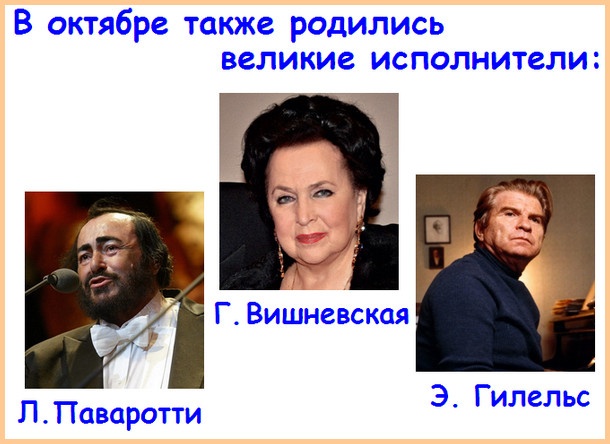

October 25 marks the 90th anniversary of the birth of the famous Russian Soviet singer Galina Vishnevskaya. Being the wife of the famous cellist Mstislav Rostropovich, the artist did not leave her career and shone on the stages of the world’s leading opera houses for many years. After the end of her singing career, Vishnevskaya did not go into the shadows. She began to act as a director of performances, acted in films, taught a lot. A book of her memoirs called “Galina” was published in Washington.
On October 27, 1782, Niccolò Paganini was born in Genoa. A favorite of ladies, an inexhaustible virtuoso, he always enjoyed increased attention. His playing captivated the audience, many cried when they heard the singing of his instrument. Paganini himself admitted that the violin owned him completely, he did not even go to bed without touching his favorite. Interestingly, during his lifetime, Paganini almost did not publish his works, fearing that the secret of his virtuoso playing would be revealed.
Unforgettable premieres
On October 6, 1600, an event took place in Florence that gave impetus to the development of the opera genre. On this day, the premiere of the earliest surviving opera, Orpheus, created by the Italian Jacopo Peri, took place. And on October 5, 1762, the opera “Orpheus and Eurydice” by K. Gluck was performed for the first time in Vienna. This production marked the beginning of the opera reform. The paradox is that the same plot was put at the basis of two fateful works for the genre.
On October 17, 1988, the London Musical Society witnessed a unique event: the performance of the 10th, previously unknown, symphony by L. Beethoven. It was restored by Barry Cooper, an English explorer, who brought together all the composer’s sketches and fragments of the score. Critics believe that the symphony recreated in this way is unlikely to correspond to the true intention of the great author. All official sources indicate that the composer has exactly 9 symphonies.


On October 20, 1887, the premiere of the opera The Enchantress by P.I. Tchaikovsky. The author supervised the execution. The composer himself admitted to his friends that, despite the stormy applause, he very keenly felt the alienation and coldness of the public. The Enchantress stands apart from the composer’s other operas and has not received such recognition as other performances.
On October 29, 1787, the opera Don Giovanni by the great Wolfgang Amadeus Mozart premiered at the Prague National Theatre. The composer himself defined its genre as a cheerful drama. The composer’s contemporaries say that the work on staging the opera took place in a relaxed, cheerful atmosphere, accompanied by innocent (and not so) pranks of the composer, helping to defuse the situation or create the right atmosphere on the stage.
G. Caccini – Ave Maria
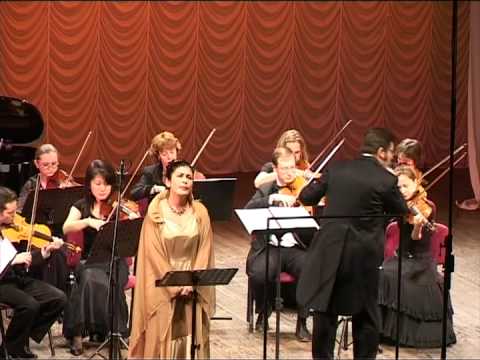

Watch this video on YouTube
Author – Victoria Denisova



